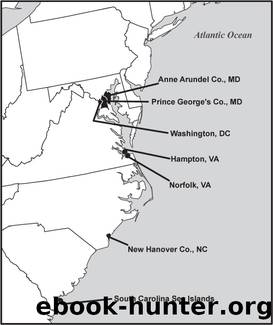The Land Was Ours by Andrew W. Kahrl

Author:Andrew W. Kahrl [Kahrl, Andrew W.]
Language: eng
Format: epub
Tags: History
ISBN: 9780674050471
Goodreads: 12854372
Publisher: Harvard University Press
Published: 2012-04-16T00:00:00+00:00
Chapter 6: Spinning Sand into Gold
Of the estimated seventy thousand persons who journeyed onto Marylandâs Annapolis Neck Peninsula on July 21, 1956, to hear Chuck Berry perform at Carrâs Beach, only eight thousand made it past the gates before the grounds were deemed filled beyond capacity. More than a few got in by swimming around or crawling under the fence that lined the property at the risk of apprehension and severe punishment by the team of African American special deputies hired by the beachâs black owners to patrol the grounds and maintain order. Others turned away that night headed toward the Clover Inn or Do-Drop Inn, two juke joints located a mile and a half down the road. Few made it home before dawn. The following morning, the Anne Arundel County sheriffâs department reported a five-mile-long traffic jam leading from the peninsula that did not empty out until nearly 4 A.M.1
By the summer of 1956, large numbers of African Americans streaming onto the Carr familyâs beachfront property on summer weekends had become a common sight for area homeowners and a telling sign of the meteoric rise of a black seasonal entertainment industry in the years following World War II. Over the previous decades, the Carr family farm on the Chesapeake Bay had gone from growing fruits and vegetables for sale in local markets to providing boarding accommodations and hosting families and groups on the familyâs beachfront property to becoming a lucrative corporate enterprise drawing in crowds (by car, bus, and foot) by the thousands from as far as New York City to play at the amusement park and midway, gamble at rows of slot machines, and watch a hot summer lineup of local and touring musicians and entertainers perform at the beachâs large, open-air concert pavilion.
The crowds gathered on the shores of commercially owned African American beaches on summer weekends reflected the role of leisure spaces in nourishing postwar black Americansâ dreams of freedom from Jim Crow and in transforming visions and expressions of black cultural identity. For a black kid growing up poor in Annapolis during these years, Carrâs Beach made summers âsomething to look forward toâa chance to be among âus.ââ2 Drawing persons of color from different neighborhoods, cities, and regions into intimate contact and fostering cultural exchange, the beach also came to reshape the very meaning of what constituted âus.â For aspiring musicians and entertainers, the demanding audiences who crowded around beachfront pavilions made summers a chance to shineâwhether as a contestant at a talent show sponsored by a local black-oriented radio station, as the opening act for a headline performer, or as one of the legion of touring musicians riding the coastal âchitlin circuitââand made the beach a critical proving ground. For a growing web of white and black investors, proprietors, marketers, laborers, and regulators, Carrâs Beach and other commercial beach resorts made summers an opportunity for work, innovation, and capital accumulation, a chance for some to pursue alternative outlets for earnings and possible freedom from
Download
This site does not store any files on its server. We only index and link to content provided by other sites. Please contact the content providers to delete copyright contents if any and email us, we'll remove relevant links or contents immediately.
| Americas | African Americans |
| Civil War | Colonial Period |
| Immigrants | Revolution & Founding |
| State & Local |
In Cold Blood by Truman Capote(3374)
The Innovators: How a Group of Hackers, Geniuses, and Geeks Created the Digital Revolution by Walter Isaacson(3129)
Steve Jobs by Walter Isaacson(2888)
All the President's Men by Carl Bernstein & Bob Woodward(2362)
Lonely Planet New York City by Lonely Planet(2210)
And the Band Played On by Randy Shilts(2185)
The Room Where It Happened by John Bolton;(2145)
The Poisoner's Handbook by Deborah Blum(2126)
The Innovators by Walter Isaacson(2096)
The Murder of Marilyn Monroe by Jay Margolis(2089)
Lincoln by David Herbert Donald(1980)
A Colony in a Nation by Chris Hayes(1921)
Being George Washington by Beck Glenn(1888)
Under the Banner of Heaven: A Story of Violent Faith by Jon Krakauer(1787)
Amelia Earhart by Doris L. Rich(1684)
The Unsettlers by Mark Sundeen(1682)
Dirt by Bill Buford(1667)
Birdmen by Lawrence Goldstone(1659)
Zeitoun by Dave Eggers(1640)
